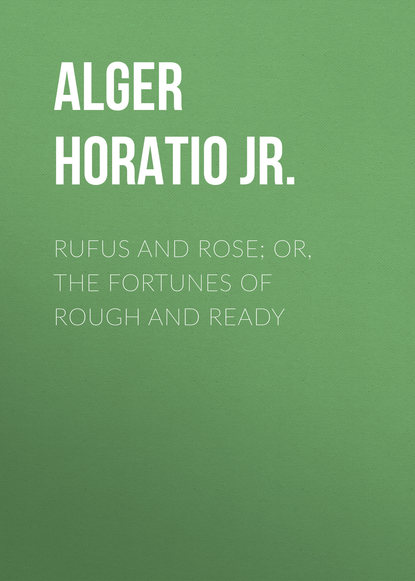По всем вопросам обращайтесь на: info@litportal.ru
(©) 2003-2025.
✖
Rufus and Rose; Or, The Fortunes of Rough and Ready
Настройки чтения
Размер шрифта
Высота строк
Поля
"Yes. I bought a package of envelopes. I told Mr. Black I was a friend of yours, so he let me have it at the wholesale price."
"Then I'm afraid I didn't make anything on that sale. When I want some dry goods may I tell your husband that I am a friend of yours, and ask him to let me have it at the wholesale price?"
"Certainly."
"Then I shall take an early opportunity to buy a spool of cotton."
"Can you sew?"
"I never took in any fine work to do, but if you've got any handkerchiefs to hem, I'll do it on reasonable terms."
"How witty you are, Mr. Rushton!"
"I am glad you think so, Mrs. Clifton. I never found anybody else who could appreciate me."
Several days had passed since the accidental encounter with Martin outside of the Academy of Music. Rufus began to hope that he had gone out of the city, though he hardly expected it. Such men as Martin prefer to live from hand to mouth in a great city, rather than go to the country, where they would have less difficulty in earning an honest living. At any rate he had successfully baffled Martin's attempts to learn where Rose and he were boarding. But he knew his step-father too well to believe that he had got rid of him permanently. He had no doubt he would turn up sooner or later, and probably give him additional trouble.
He turned up sooner than Rufus expected.
The next morning, when on the way from the bank with a tin box containing money and securities, he suddenly came upon Martin standing in front of the general post office, with a cigar in his mouth. The respectable appearance which Martin presented in his new clothes filled Rufus with wonder, and he could not avoid staring at his step-father with surprise.
"Hillo!" said Martin, his eye lighting up with malicious pleasure. "So you didn't know me, eh?"
"No," said Rufus.
"I'm in business now."
"I'm glad to hear it," said Rufus.
"I get a hundred dollars a month."
"I'm glad you are prosperous, Mr. Martin."
"Maybe you'll be more willing to own the relationship now."
"I'm glad for your sake only," said Rufus. "I can take care of Rose well enough alone. But I must be going."
"All right! I'll go along with you."
"I am in a hurry," said Rufus, uneasily.
"I can walk as fast as you," said Martin, maliciously. "Seein' you're my step-son, I'd like to know what sort of a place you've got."
The street being free to all, Rufus could not shake off his unwelcome companion, nor could he evade him, as it was necessary for him to go back to the office at once. He consoled himself, however, by the reflection that at any rate Martin wouldn't find out his boarding-place, of which he was chiefly afraid, as it might affect the safety of Rose.
"What have you got in that box?" asked Martin.
"I don't care to tell," said Rufus.
"I know well enough. It's money and bonds. You're in a broker's office, aint you?"
"I can't stop to answer questions," said Rufus, coldly. "I'm in a hurry."
"I'll find out in spite of you," said Martin. "You can't dodge me as easy as last time. I aint so poor as I was. Do you see that?"
As he spoke he drew out a roll of bills (they were counterfeit, but Rufus, of course, was not aware of that), and displayed them.
Our hero was certainly astonished at this display of wealth on the part of his step-father, and was puzzled to understand how in the brief interval since he last saw him he could have become so favored by fortune, but his conjectures were interrupted by his arrival at the office.
"Turner!" repeated Martin to himself, observing the sign. "So this is where my dootiful step-son is employed. Well, I'm glad to know it. It'll come handy some day."
So saying, he lighted a fresh cigar, and sauntered away with the air of a man of independent means, who had come down to Wall Street to look after his investments.
CHAPTER XV.
THE TIN BOX
"I met my dootiful son this mornin'," remarked Martin to his employer, at their next interview.
"Did you?" said Smith, carelessly, for he felt little interest in Martin's relations.
"Yes; he's in business in Wall Street."
"How's that?" asked Smith, his attention arrested by this statement.
"He's with Turner, the banker. He was going to the bank, with a tin box under his arm. I'd like to have the money there was in it."
"Did he tell you there was money in it?"
"No; but I'll bet there was enough in it to make a poor man rich."
"Perhaps so," said Smith, thoughtfully.
"How old is your son?" he inquired, after a pause.
"Fifteen or sixteen, I've forgotten which. You see he isn't my own son; I married his mother, who was a widder with two children; that's the way of it."
"I suppose he doesn't live with you."
"No; he's an undootiful boy. He haint no gratitude for all I've done for him. He wouldn't care if I starved in the street."
"That shows a bad disposition," said Smith, who seemed disposed to protract the conversation for some purposes of his own.
"Yes," said Martin, wiping his eyes pathetically with a red handkerchief; "he's an ungrateful young scamp. He's set my little daughter Rose ag'inst me,—she that set everything by me till he made her believe all sorts of lies about me."
"Why don't you come up with him?"
"I don't know how."











